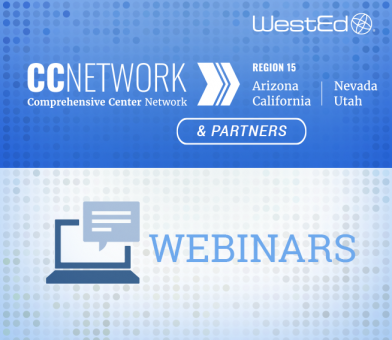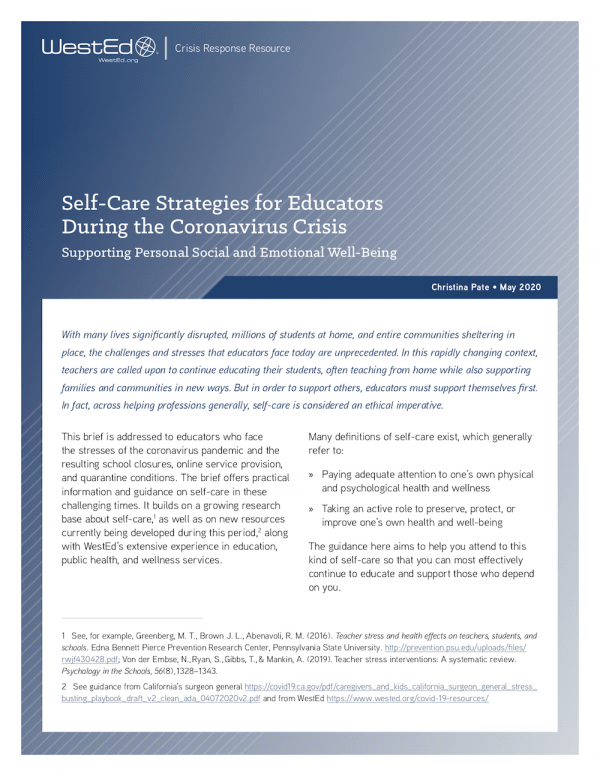COVID-19 Resources for Educators
Today’s extraordinary circumstances present new challenges for you and other educators striving to continue your core work — whether it be teaching, leading, or policymaking, and whether it be at the K-12 level, in higher education, or in early care and education programs.
WestEd is committed to supporting your efforts. This site offers an evolving selection of timely, evidence-based resources and guidance, designed to help you continue to make a positive difference in the lives of children, youth, and adults during these difficult times. We hope you find them useful and that you and your families and communities remain safe and healthy.
View Timely and Useful Resources by Topic Area
anchor
Distance & At-Home Learning
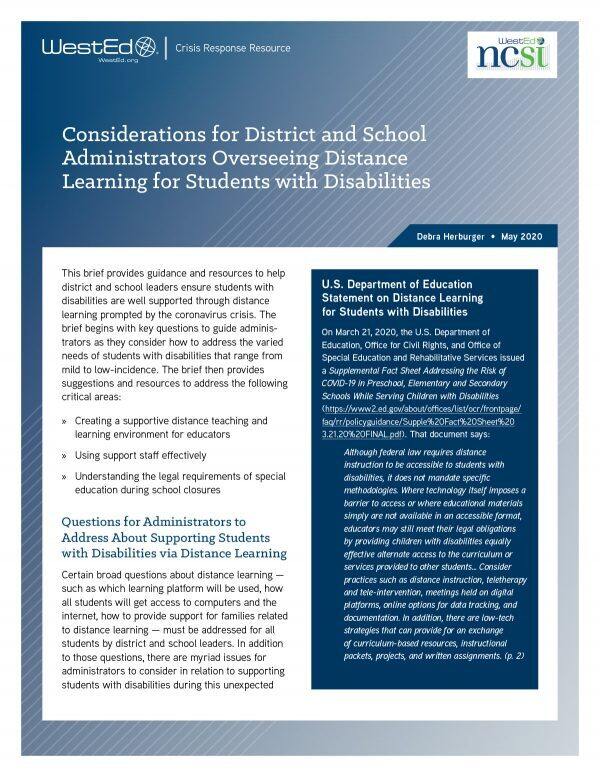
Considerations for District and School Administrators Overseeing Distance Learning for Students with Disabilities
This brief provides guidance and resources to help districts and schools support students with disabilities through distance learning prompted by COVID-19. The brief presents guiding questions for administrators to consider when decisionmaking and offers suggestions and resources on creating safe environments for teachers, providing support for staff, and understanding legal requirements.

REL West Webinar: Engaging Parents and Students from Diverse Populations in the Context of Distance Learning
Without opportunities to interact in person, it is essential that educators, students, and their caregivers see themselves and each other as equal partners in the context of distance learning. This free, one-hour webinar focuses on state, district, and school-based strategies, including practicing cultural responsiveness and establishing two-way communication, to support diverse learners and their families during the coronavirus crisis.
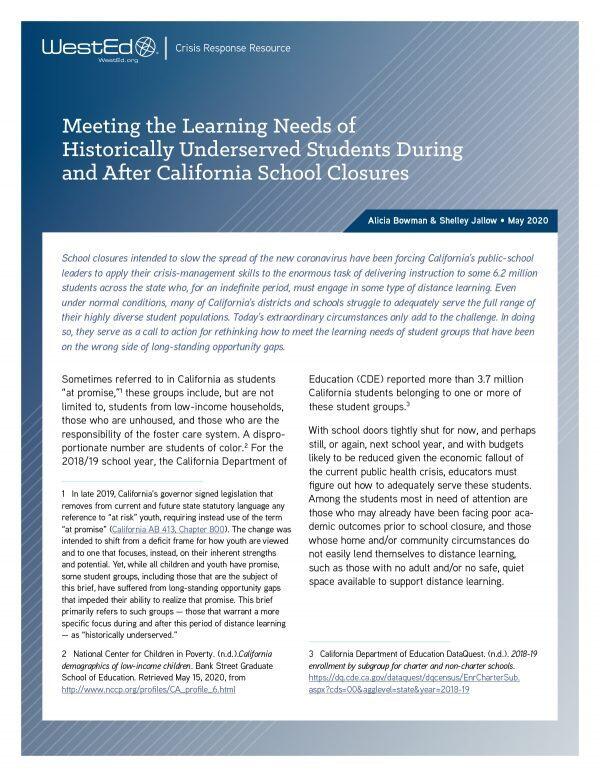
Crisis Response Resource: Meeting the Learning Needs of Historically Underserved Students During and After California School Closures
Written primarily for district and school leaders, this paper produced by WestEd offers important considerations for keeping a focus on diverse student groups not just during this initial period of distance learning but, also, in planning for the 2020/21 school year and beyond. This paper addresses core areas of instruction, technology infrastructure, policies and practices, ongoing data collection, implementation, and family engagement.
anchor
Early Childhood

Caring for Young Children While Sheltering in Place
Are you caring for a young child or children at your home? Do parents in your community need some help thinking of ideas for fun, engaging activities? This comprehensive activity guide provides quick access to tips and activities to use with children, aged birth to five, throughout the day.

California MAP to Inclusion & Belonging…Making Access Possible Coronavirus Part 1
The mission of California MAP to Inclusion & Belonging…Making Access Possible is to create a statewide system of support, training, and resources that gives all families and providers barrier-free access to inclusive childcare. With partnership from WestEd, Taking Care of the Children – Six Sets of Resources is the first in a series of newsletters that gathers helpful information and resources to support early learning and care providers and families during the Coronavirus crisis. Content emphasizes the specific needs of children with disabilities.
Coronavirus (COVID-19) Part I: Taking Care of the Children – Six Sets of Resources

California MAP to Inclusion & Belonging…Making Access Possible Coronavirus Part 2
California MAP to Inclusion & Belonging…Making Access Possible, in partnership with WestEd, presents the second newsletter in a series. The focus of Resources for Professionals Working During the Pandemic is to provide timely tools and solutions to serve children of essential workers, while also highlighting early intervention and early childhood special education support related to distance learning.
Coronavirus (COVID-19) Part 2: Resources for Professionals Working During the Pandemic
anchor
English Learners

Effective Questioning in Grades K-2: The Development of Oral Language in a Distance Learning Environment
As part of a webinar series designed to support English Language Learners in distance learning settings, this installment introduces oral language development and its importance for English learners, suggests strategies to help educators design engaging questions using grade-level texts and increase opportunities for student talk in distance learning environments.
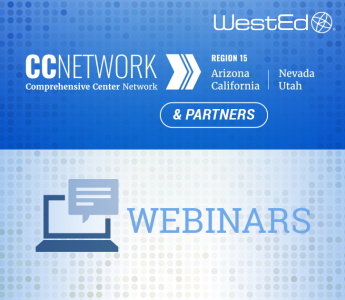
Webinar Series: Supporting Multilingual and English Learner Students During Distance Learning
This 13-part webinar series addresses the ways educators can support multilingual and English learner students in the context of distance learning settings. Topics include: supporting young English learners with language and literacy development, lesson planning for distance learning environments, family engagement, analyzing text themes, effective questioning, activities for developing English learners’ oral language skills through peer interaction and by engaging in the learning and doing of math, science, and engineering.
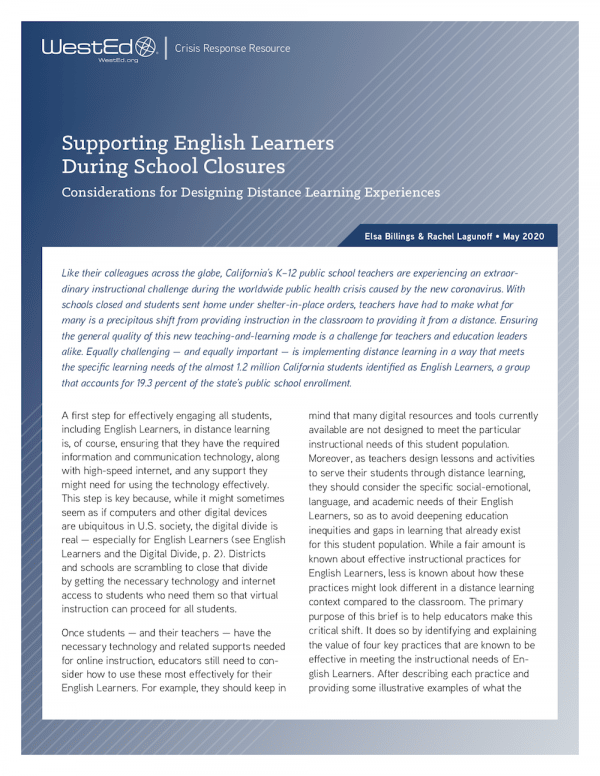
Crisis Response Resource: Supporting English Learners During School Closures
This brief is designed to help educators make the critical shift from in-person learning to distance learning to support English learner students. The brief identifies and explains the value of four key practices known to be effective in meeting the instructional needs of English learner students, and provides guidance for how these practices might be applied in different types of distance learning contexts.
anchor
Resilient and Healthy Schools and Communities’
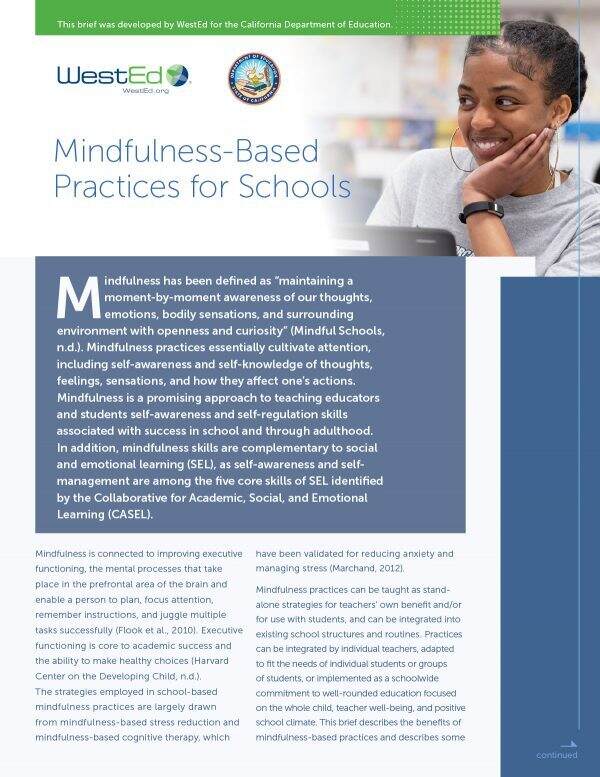
Mindfulness-Based Practices for Schools
This WestEd brief, developed for the California Department of Education, describes what administrators and teachers can do now to promote the benefits of mindfulness, a promising, evidence-based approach to helping educators and students develop self-awareness and self-regulation skills that are associated with success in school and through adulthood.
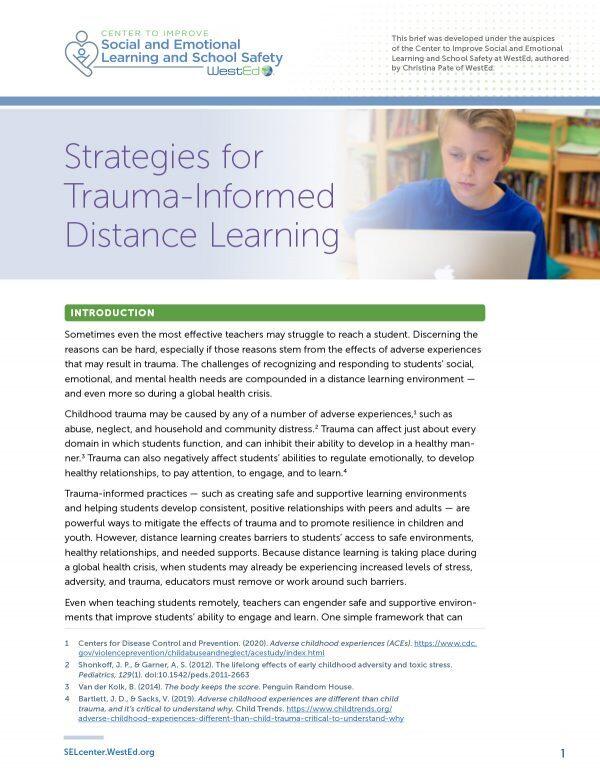
Strategies for Trauma-Informed Distance Learning
To help educators use trauma-informed teaching practices in distance learning contexts, this brief offers strategies for recognizing and responding to students’ social and emotional needs while teaching remotely, organized around neuroscientist Bruce Perry’s “3 Rs” approach to interventions: “Regulate, Relate and Reason.”
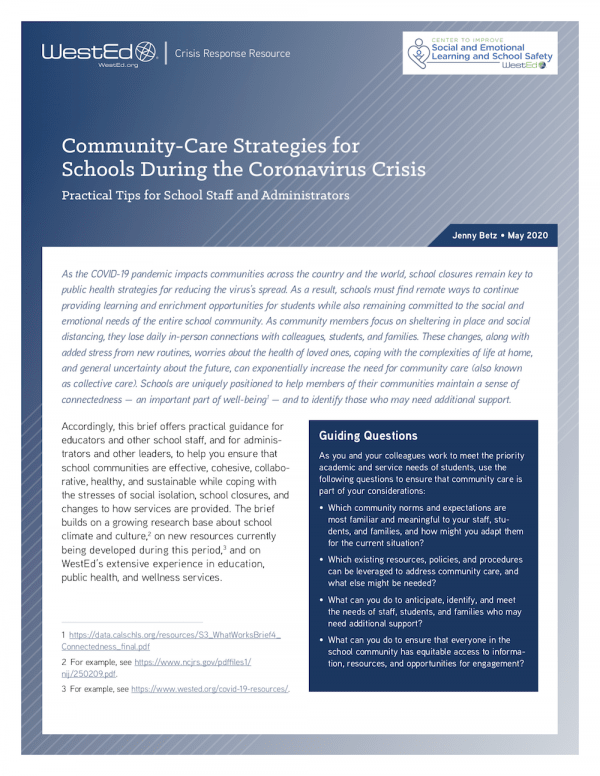
Crisis Response Resource: Community-Care Strategies for Schools During the Coronavirus Crisis
During the coronavirus pandemic, schools must find remote ways to continue providing learning and enrichment opportunities for students while also remaining committed to the social and emotional needs of entire school communities. The brief includes sections on maintaining community and connectedness for staff, students, and families, and on identifying those most in need of extra support. It also provides some brief “tech tips” for online community building.
anchor
Online Professional Development

Online Professional Development Resources for Behavior and Classroom Management Implementation
This archived webinar highlights free, online professional development modules and instructional resources to help educators implement and sustain classroom management and behavioral interventions. While students are engaged in distance learning in response to COVID-19, some content may be applicable to online learning environments and student dynamics.

Converting In-Person Activities to Engaging Distance Learning Opportunities
Many of the strategies educators and leaders use during in-person settings can also be used in the distance learning environment — learning objectives need to be adjusted and the activities might need a bit of alteration. This Insights post describes how to shift from seven common in-person scenarios — such as introductions and ice-breakers — to the digital environment.
anchor
Resource Planning & Management

Special Education Funding: Three Critical Moves State Policymakers Can Make to Maintain Funding and Bolster Performance
The brief guides policymakers to reaffirm the state’s commitment to educating students with disabilities, to use state policy to promote early intervention and to coordinate services, and to leverage flexibility in using federal and state special education funds.

Loosening The Reins: Evidence and Considerations for Lifting Restrictions on Resources for Schools
This brief offers critical moves state policymakers can make to find the right balance between state control versus more local control during an economic recession.
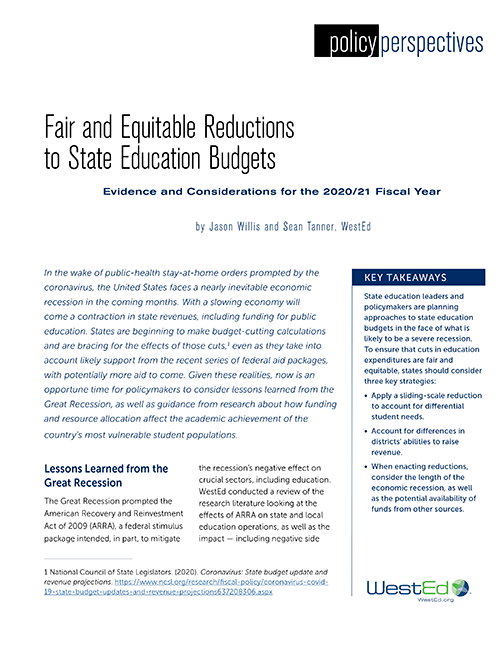
Policy Perspective: Fair and Equitable Reductions to State Education Budgets: Evidence and Considerations for the 2020/21 Fiscal Year
This newly released paper produced by WestEd explores the impact of a nearly inevitable economic recession and contraction in state revenues, including funding for public education. Written primarily for policymakers, this paper aims to provide districts and states making budget-cutting calculations with lessons learned from previous policy decisions which unintentionally exacerbated funding inequalities between lower- and higher-wealth school districts across the country. It also presents important research-based considerations about how funding and resource allocation affect the academic achievement of the country’s most vulnerable populations.
anchor
Science & Mathematics

“We’re All In This Together”: Carnegie Math Pathways Helps Educators Transition to Distance Learning Amid COVID-19
Carnegie Math Pathways is helping its national network of math faculty with the abrupt transition to distance learning. In addition to facilitating collaboration and offering resources and guidance, the Pathways team have “helped with setting expectations — what are some realistic goals for transitioning to distance learning on a dime in the midst of a crisis,” says executive director Karon Klipple.

Free Sample Lessons: Math Pathways & Pitfalls
Math Pathway & Pitfalls helps students tackle stubborn math pitfalls head-on, transforming challenges into pathways for learning. Download free sample lessons for elementary and middle school students and their families to support improved learning. Lessons are appropriate for supplemental use during distance learning.
anchor
Special Education
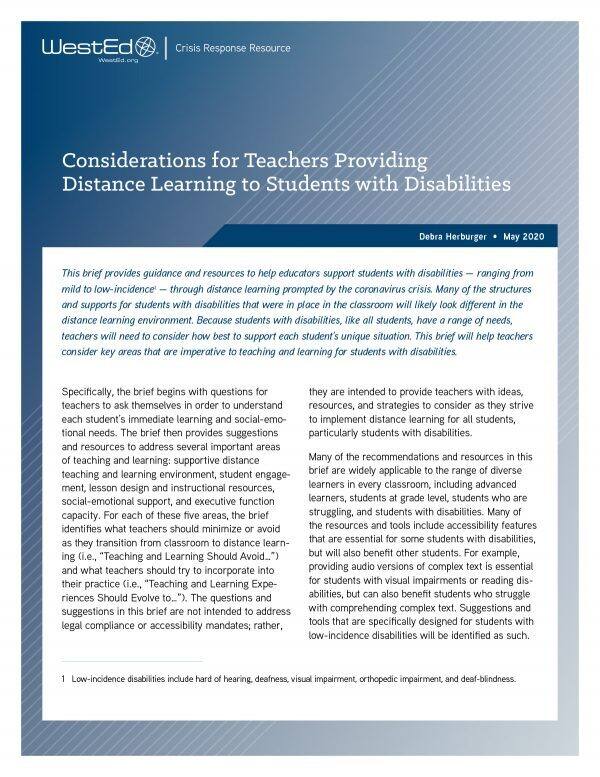
Crisis Response Resource: Considerations for Teachers Providing Distance Learning to Students with Disabilities
Because students with disabilities, like all students, have a range of needs, teachers will need to consider how best to support each student’s unique situation. This brief will help teachers consider key areas that are imperative to teaching and learning for students with disabilities.

Resource Planning for Students with Disabilities During the COVID-19 Pandemic
This archived webinar will discuss how to manage resource identification and allocation to ensure the needs of students with disabilities are appropriately addressed and help you maximize resources to improve outcomes for all students.

NCSI COVID-19 Resource Hub
The National Center for Systemic Improvement (NCSI) continues to mobilize to meet the needs of states, educators, and parents to support all students with disabilities. Explore NCSI’s COVID-19 Resource Hub for policy guidance, distance learning support, and tele-practice/tele-therapy resources.










